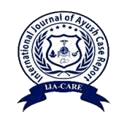Ayurvedic Management of Vipadika (Palmo-Plantar Psoriasis) -A Case Report
Abstract
All skin disorders in Ayurveda are considered under the broad term “Kushtha”. Vipadika is included under the heading of ‘KshudraKushtha’ (Type of Kushtha). Vipadika is characterised by Sphutun i.e fissures either in palms or soles or in both associated with Teevravedna i.e. severe pain. Vipadika is correlated with palmo-plantar psoriasis which is a chronic skin disease which mainly affects either palms or sole or both. The treatment method for palmo plantar psoriasis cause severe side effects thus it requires an evident shift from modern treatment to ayurvedic treatment line. In the present case, a female patient with complaints of dryness and cracking of both soles associated with pain and intermittent bleeding, since three years, came to OPD and was diagnosed as Palmo-plantar Psoriasis and was treated as Vipadika with the Shamanaushadi along with Padnimajjan in Til Tail and Nimba Tail. The patient reported a significant improvement in the complaints in aspan of 15 days and a complete relief in a treatment of two months.Thus,from above casereport, we can recommend the Ayurvedic regimen as a line of treatment for palmo plantar psoriasis without any intervention of modern medicine.

This work is licensed under a Creative Commons Attribution-NonCommercial-NoDerivatives 4.0 International License.

